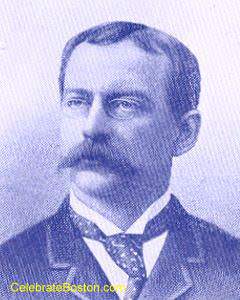 |
Mayor Nathan Mathews Jr.
Served 1891-1894
"Born in Boston, March 28, 1854; died December 11, 1927, served as Mayor during 1891-1894.
The best evidence of the effectiveness of Mayor Matthews' administration is contained in his valedictory address, which is not merely a review of his own work, but based upon patient search into the past history of municipal government of Boston. This address supplies the first general description of the city administration published since the time of Quincy's municipal history: which ended with the year 1830.
If one should single out special features of Mayor Matthews' administration, one would perhaps give first place to his insight into the organization and functions of city government, his grasp of municipal finance, and his outspokenness in condemning what to him seemed improper or wrong. Among constructive measures affecting the governmental machinery itself, which were introduced by Mayor Matthews, may be mentioned the consolidation of the departments of Cambridge Bridge, Sewers and Sanitary Police with the Street Department, under a single superintendent; and the abolition of the Ancient Records Commission whose work was assigned to the City Registrar.
Mayor Matthews stood distinctly for a longer term of office for the Mayor and his executive officers than had hitherto prevailed, favoring that heads of departments as well as subordinate officers should hold office until death, resignation, or removal.
The City Council of 1892 passed an ordinance forbidding city employees to serve on political committees. An attempt to repeal the ordinance the following year was prevented by the Mayor's veto. Thus Boston was the first, and certainly remained the sole public body in the country at the time of Mayor Matthews' administration which prohibited office holders from serving on political committees or acting as delegates to political conventions.
In regard to the legislative branch of the city government, he opposed the bi-cameral system, and would substitute a single legislative body. He condemned unqualifiedly the election of the Board of Street Commissioners by popular vote.
Mayor Matthews greatly opposed any the interference by the state in city affairs. Accordingly, he advocated strongly the abolition of the State Board of Police, holding that it was 'not responsible to the city government, and composed necessarily of gentlemen who, whatever their personal qualifications, are yet regarded by the majority of the voters of this city with distrust.' He also asserted that the Police Department had never been 'so mismanaged as between the years 1889 and 1893.'
Of Matthews' fiscal reforms there is not room to write at length. He stood steadfastly against an expansion in the city expenditures except for absolutely necessary purposes. During his term of four years, he vetoed 241 loans or items in loan bills involving an expenditure of $2,683,375, and could say at the end of his administration: 'No loans have been issued for current expenses during the last four fiscal years.'
Mayor Matthews' general concern regarding questions relating to public health were substantial. He foresaw that the water supply from the Sudbury river system would soon reach the limit of its capacity, and he was instrumental in having the General Court [state legislature] authorize the State Board of Health to make an elaborate inquiry into future sources of water supply.
He was especially eager to see more attention paid to industrial education than heretofore and advocated a liberal appropriation for the establishment of the Mechanic Arts High School. The building for this branch of school work was opened in 1893. During his term, fourteen primary schools and three grammar schools were constructed while others were begun. The Suffolk County Court House was completed; the Public Library was nearly completed, and various buildings on the public parks were constructed, not to mention the different structures for the use of other city departments.
Aside from making many improvements in the construction of public streets and their maintenance, including determined efforts to secure for the city an adequate compensation for the use of streets, Mayor Matthews took an active part in promoting the construction of the first subway. The necessary legislative authority was obtained in 1894 and subsequently ratified by popular vote. That this momentous step was taken can in large part be attributed to the farsighted policy initiated by the Mayor.
Much attention was given to the development of the park system within the city, and the Mayor felt it advisable 'that the city should lend its aid in every legitimate way to the scheme of Metropolitan park improvements.' Mayor Matthews had a keen eye to the development of commercial facilities of Boston and made valuable recommendations for their extension, but it did not fall to him to engage in constructive work of this kind on a large scale."
